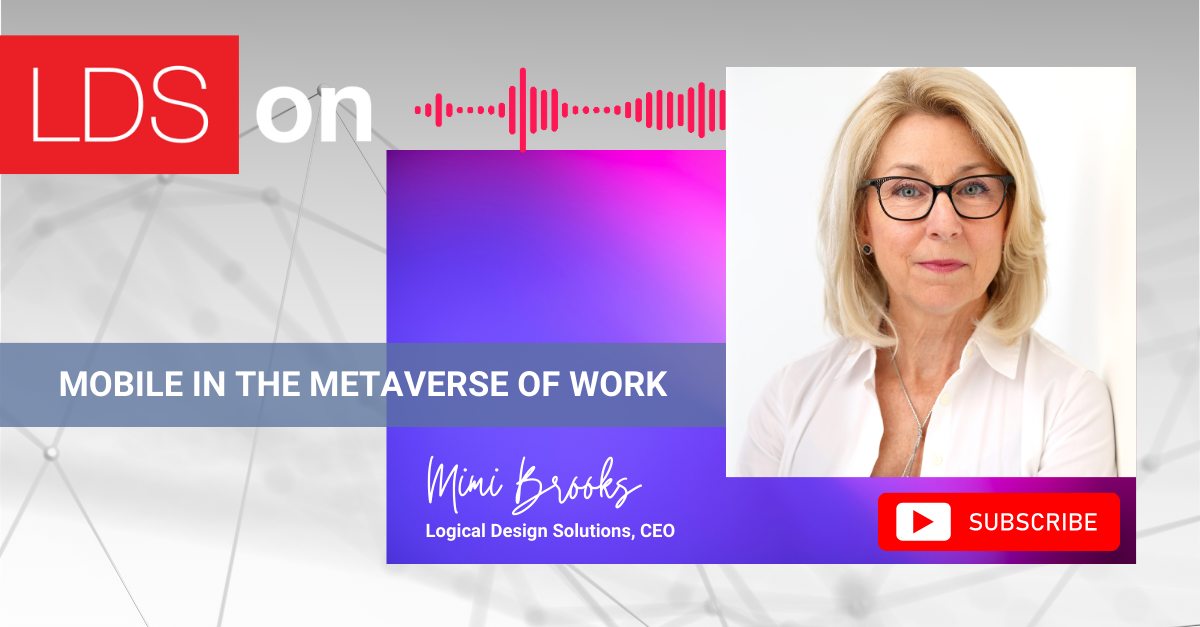3 min read
LDS On: Mobile in the Metaverse of Work
In this episode of “LDS On,” CEO Mimi Brooks addresses how the ongoing pandemic has massively increased the mix of work performed remotely, which...
4 min read
.png) Mimi Brooks
:
6/4/21 11:05 AM
Mimi Brooks
:
6/4/21 11:05 AM
The World Economic Forum has identified certain areas where shared business goals would be beneficial to ensure an inclusive, trusted and sustainable digital future. At the highest level these include:
In this video, LDS CEO Mimi Brooks discusses the importance of implementing a digital strategy that not only engenders trust, but also inclusivity, such as putting employees first, establishing worker wellbeing measures, grasping the value of solidarity, promoting confidence in systems, and the ways business and government can help to bridge the growing digital divide.
Brooks outlines a strategic approach that minimizes risk to the company while at the same time shaping how emerging technologies impact our ways of doing business and preparing our employees for a future of work where new business models combine economic viability with business practices that are socially sustainable.
Welcome to the ninth video in a series of LDS thought-leadership dedicated to the discussion of transformation management.
In each bi-weekly video, we’ll address a topic of strategic interest to business leaders who are guiding their organizations through transformative change.
Today, it’s important to consider how we can implement a sustainable digital strategy that not only engenders trust, but also inclusivity. This could include the importance of putting employees first, establishing worker wellbeing measures, grasping the value of solidarity, promoting confidence in systems, and the ways business and government can help to bridge the growing digital divide.
So, this is LDS On: Building an Inclusive, Trustworthy and Sustainable Digital Future. Let’s get started…
The Davos Manifesto 2020, entitled ‘The Universal Purpose of a Company in the Fourth Industrial Revolution’, expands on the principles of stakeholder capitalism by stating that “A company is more than an economic unit generating wealth. It fulfills human and societal aspirations as part of the broader social system. Performance must be measured not only on the return to shareholders, but also on how it achieves its environmental, social and good governance objectives.”
Around the same time, 120 influential CEOs who comprise the members of the International Business Council, or IBC, focused on the significance of environmental, social and governance (ESG) aspects of business performance and risk, particularly the challenge that corporations face in demonstrating long-term value creation for all stakeholders on an internationally consistent basis across industries.
The absence of an international framework for the reporting of ESG contrasts starkly with the established standards that exist for reporting and verifying financial performance. So, the IBC launched an initiative to identify a core set of material ESG metrics and recommended disclosures that could be included in the annual reports of companies on a consistent basis across industry sectors and countries.
At the heart of this exercise was the belief that ESG and other factors relevant to sustainable value creation are increasingly material to business performance. As a result, the IBC defined a set of 21 metrics – organized into 4 pillars aligned to the UN’’s Sustainable Development Goals.
These include:
We see the IBC initiative as a crucial stepping stone for business on the path to inclusivity, which in a digital sense does not just refer to the growing ‘digital divide’ around internet access and accessibility, but also includes social and economic benefits and opportunities to shape how technologies impact our lives.
It is also integral to building trust, which is the essential ingredient to boosting employee engagement, motivation, and openness through transparent privacy, security, accountability and participatory practices that establish an aura of managerial competency.
Finally, this initiative also embraces a sustainable digital future, that involves developing business models that are economically viable and business practices that are socially sustainable.
Given these ambitious targets, we must also acknowledge that such a bright and promising future will require a collective response, not just from business, but also from policy makers, workers and customers alike.
While all this sounds fine, there are some real challenges to face in terms of transparency of reporting. Stakeholder expectations are incrementally rising when it comes to metrics such as those depicted here.
Along with managing other constituent relationships relative to ESG, we need to get ahead of the curve and bring these types of measure into our Employee Experiences to share along with our purpose and culture, which are already aligned with these commitments.
There are also some barriers to overcome in the achievement of these goals, including the commercial, legal, regulatory, reputational and liability issues that organizations face today.
For example, companies clearly do not wish to have any proprietary or commercially sensitive information exposed by ESG-oriented metrics, while complications can also arise if a metric involves sharing data across multiple sectors governed by different regulators.
Having said that, the WEF has identified six initial areas where shared goals would be beneficial to ensure an inclusive, trusted and sustainable digital future. These areas provide a framework for future dialogue and collaboration on shaping the digital economy and society.
These include:
In summary, building an inclusive, trustworthy and sustainable digital future means following a roadmap that minimizes risk to the company while at the same time shaping how emerging technologies impact our ways of doing business and preparing our employees for the future of work.
We must also promote trust through effective and enforceable privacy, security, accountability, transparency, and participatory practices, especially in the online environment.
Finally, our new business models must combine economic viability with business practices that are socially sustainable.
The fact is that ESG and other factors relevant to sustainable value creation are becoming increasingly important to not only business performance, but also public perception. Conformance to the metrics identified by the World Economic Forum and International Business Council provide a gateway to corporate longevity as this Fourth Industrial Revolution continues to unfold at breakneck speed.

3 min read
In this episode of “LDS On,” CEO Mimi Brooks addresses how the ongoing pandemic has massively increased the mix of work performed remotely, which...

7 min read
To survive and flourish, leaders will need an agile mindset to systematically innovate, so that their organizations can harness the full potential of...

5 min read
Business leaders must recognize and act when drags on realizing institutional innovation interfere with critical momentum. This means understanding...